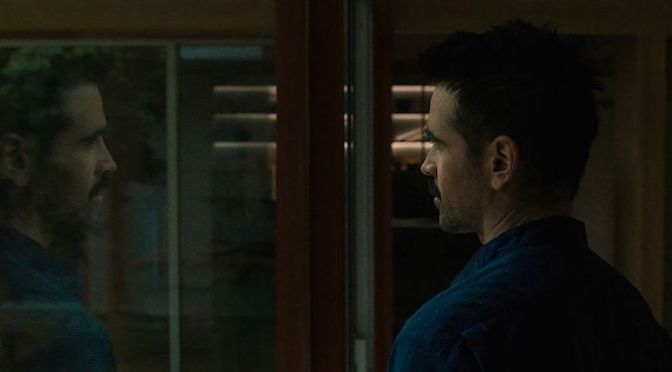 Columbus, the debut feature from writer/director Kogonada, was so quietly self-assured that I figured I knew what to expect from his sophomore effort After Yang. Carefully composed framing, slow-but-steady pacing, and a general construction so precise that it borders on the architectural (and not just because Columbus was partly about architecture) — these are the hallmarks I readied myself for in After Yang, which premiered last week at the Sundance Film Festival.
Columbus, the debut feature from writer/director Kogonada, was so quietly self-assured that I figured I knew what to expect from his sophomore effort After Yang. Carefully composed framing, slow-but-steady pacing, and a general construction so precise that it borders on the architectural (and not just because Columbus was partly about architecture) — these are the hallmarks I readied myself for in After Yang, which premiered last week at the Sundance Film Festival.
…so an opening that included the year’s flashiest techno dance sequence could very much be called a surprise. Based on Alexander Weinstein’s 2016 short story Saying Goodbye to Yang, Kogonada’s second feature is definitely the work of a director trying to reach farther, trying to push out beyond the bounds of his finely-calibrated debut. It’s an admirable and exciting endeavor, and After Yang would be disappointing if it adopted the personality of Columbus. In certain respects — see: techno dance sequence — this endeavor is a success. But After Yang is a bit disappointing in other ways, even if only in falling short of the high bar Kogonada set for himself.
As is commonly the case with sophomore features by those who’ve found fledgeling success in cinema, the caliber of the actors is the most superficial advancement here. Colin Farrell, of late, has been that great brand of A-lister who seems to have time for the trivial action shit you’d expect — Fantastic Beasts, Ava, the abysmal Total Recall remake — but also a lot of auteur-driven films, like Sofia Coppola’s The Beguiled and Yorgos Lanthimos’s one-two punch of The Lobster and The Killing of a Sacred Deer. Here, Farrell and Jodie Turner-Smith play father and mother to the young Mika (Malea Emma Tjandrawidjaja), adopted from China. The family also includes Yang (Justin H. Min), a robot programmed to help care for Mika as an older brother figure. Once Yang’s “demise” kicks off the events of film, Farrell’s Jake effectively becomes the main character.
There are a few small moments from Farrell worth mentioning (more in a moment), but it’s Mika and Yang himself that really comprise the soul of this film. Tjandrawidjaja and Min give a pair of absolutely electric performances, the former impressive for Tjandrawidjaja’s tender age (10) and the latter for just how believable Yang is as a sentient robot. One of the film’s best scenes shows just how important Yang was to Mika, acting as a cultural guide, an older brother and at times a full-fledged parent. After Yang loses a step when Farrell takes the reins, not because his performance is flat, but simply because we happen to now be following the least interesting of the available characters.
Of course, maybe that’s part of the point: we feel Yang’s absence. In Moonlight, Mahershala Ali’s absence for the majority of the runtime is exacerbated by the immensity of his presence in the first of the film’s three parts. Yang works much the same way here, except we can still see Yang, his lifeless android body splayed open in a chop shop. The moral quandaries raised by the “death” of this robotic familial position After Yang squarely as hard sci-fi, a thinker in the vein of Alex Garland’s efforts of late (Ex Machina, Annihilation, Devs). But as a whole there’s a certain energy lacking, little to carry you from buzzy high to buzzy high.
Those highs aren’t necessarily moments of explicit action, either (besides the bangin’ dance sequence). As Jake virtually walks through Yang’s memories, the most striking aspect of the android’s experience lies in the appreciation of small things. Jake himself seems to have appreciated this about the world at one point — he’s a tea purveyor, and speaks eloquently on the allure of the process of tea — but forgot it along the way. Parenting Mika proved a challenge, hence Yang’s enlistment in the first place, but perhaps Jake never got back to that appreciation of life. The dance goes on, you see, night after night. But one of the film’s most elegant moments sees Jake walking outside in the light rain, eyes closed, face to the sky. In the context of what Jake’s just experienced in Yang’s memories, the misty rain drips down the face of a man who’s just remembered how beautiful small moments can be.
“What a caterpillar calls the end, the rest of the world calls a butterfly.” Yang himself relays this saying about death, whether or not a machine built to dispense cold facts from an archived library can actually comprehend it. After Yang does indeed comprehend the ramifications of such conundrums, and it engages with these lofty ideas all while championing something as small as a light afternoon rain. A little more action in the telling might have befit Yang in a way that would likely have been at odds with Columbus, but again, as this qualm is mostly pitting Kogonada against himself, perhaps it’s not really a qualm at all. Perhaps the rest of the world calls it something else.

